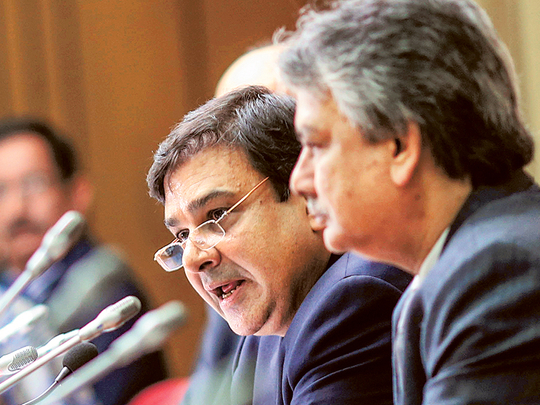
MUMBAI: Indian sovereign bonds will rebound after suffering their biggest loss in more than three years as benign cash conditions in the banking system spur demand for debt and policymakers return to cutting interest rates in early 2017, according to HSBC Holdings Plc.
The benchmark 10-year yield jumped 21 basis points on Wednesday, the most since September 2013, after a panel led by Reserve Bank of India Governor Urjit Patel unexpectedly left the key repurchase rate at 6.25 per cent. HSBC retained its forecast for the 10-year yield, which sank 55 basis points in November and reached the lowest since April 2009, to drop to 6 per cent by March 31. The yield rose three basis points to 6.44 per cent on Thursday.
“We will still be looking for lower bond yields, led by short-dated bonds,” said Himanshu Malik, a strategist at HSBC in Hong Kong. “Liquidity conditions are still likely to remain flush in coming months and we still think that policy rate cuts will be delivered early next year.”
India’s inflation could slow by 10-15 basis points in October-December due to the government’s currency recall, according to Wednesday’s statement from the monetary policy committee, or MPC.
Standard Chartered Plc expects the benchmark repo rate to be lowered by 50 basis points over the next two policy meetings in February and April, according to a report Wednesday. The decline in India’s 10-year sovereign yield over the past three months is the biggest among similar-maturity notes in 28 emerging markets tracked by Bloomberg. Here’s what other strategists and money managers have to say:
Trust Capital Services India Pvt.
These are “good levels to buy bonds” as the inflation outlook is extremely benign, said Sandeep Bagla, Mumbai-based associate director at Trust Capital. Market realities are likely to “force RBI’s hand in cutting rates at a later stage,” he said, predicting a 25-basis point reduction in the repo rate in February.
Schroder Investment Management Ltd.
“Globally, the imminent tightening of monetary policy in the US is triggering bouts of high volatility in financial markets, with the possibility of large spillovers that could have macroeconomic implications for” emerging-market economies, according to the MPC’s statement.
Rajeev de Mello, head of Asian fixed income at Schroder Investment in Singapore said “Asian central banks are concerned” about a probable Federal Reserve rate hike later this month. The RBI is aiming to maintain financial stability “in a period of global policy pivot from monetary to fiscal,” he said.
Nomura Holdings Inc.
The policy statement suggests they are viewing the impact of the government’s recent demonetisation move as “temporary,” said Vivek Rajpal, Singapore-based rates strategist at Nomura. Factors such as excess liquidity and a further possibility of monetary easing will still keep the rates market rangebound beyond the initial sell-off, he said.
The RBI on Wednesday withdrew the temporary increase in lenders’ cash reserve ratio requirement that it announced last month. From Dec. 10, banks would no longer need to sequester these deposits, it said in a separate statement.
Quantum Asset Management Co.
This decision “does not rule out further rate cuts and if the impact of demonetisation does indeed lead to lower inflation and slower growth, then the RBI will look to cut rates in its February policy review,” Murthy Nagarajan, head of fixed income in Mumbai at Quantum Asset, wrote in a note. By then, the RBI will have greater clarity on the Fed and Donald Trump’s policies, allowing it to take a “more balanced view.”
Gross value added — a key input of gross domestic product — will grow 7.1 per cent in the year to March, instead of the 7.6 per cent forecast earlier, with risks evenly balanced, according to the panel’s statement.
Mirae Asset Global Investments India Pvt.
“The current sharp rise in yields can turn out to be a good opportunity for long-term investors,” Mahendra Kumar Jajoo, Mumbai-based head of fixed income Mirae Asset, wrote in a note. “We expect the long-term trend of easing inflation” and falling bond yields “to remain intact,” he wrote.












